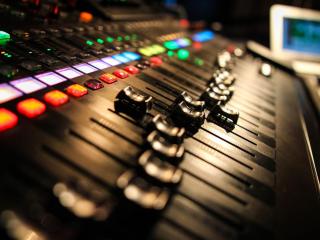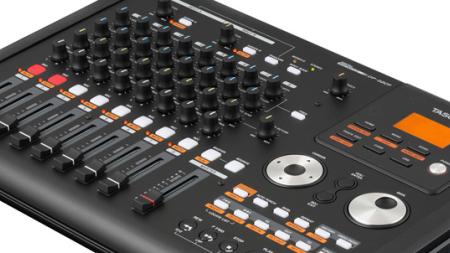
It seems to be the battle of the century: is analogue or digital better for recording? Do plugins sound as good as hardware? Is analogue summing better than "in the box"? Does tape add a magical quality that you can't get anywhere else?
There are positive and negative aspects of both recording techniques, and it seems like a lot professionals have their own preferences. Recording legend Trevor Horn thinks that knowing how to use both methods is the best - he believes it is best to learn on analogue, because then optimizing on a digital recording will come very easily.
Horn related it to learning how to drive. Learning to drive a manual transmission is great for the experience, and then driving an automatic vehicle is simple and comes naturally. Sames goes with recording. Learning to record with analogue machines is very tedious. Horn thinks a lot of the younger generation would do well to learn how to record on analogue machines because of the demanding nature of optimizing on tape. Transferring those skills to a digital recording could only help their production skills.
Analogue vs. Digital

Before we get into the technical differences of the two recording methods, let's briefly explain what we mean when we say "analogue" and "digital" in the realm of recording music.
Analogue audio is called just thins because the pattern of an electrical or magnetic pressure audio signal is analogous to the original pattern of changing air pressure. What we hear, the audio, is analogue until our inner ear converts it into an electro-chemical signal which we then perceive as music!
Digital is very different. Digital audio is a series of mathematical descriptions reflecting the pattern of the pressure. These descriptions could be transmitted as a pulse wave, a series of on/off transistors, magnetic pulses, optic pics and lands, and generally looks nothing like the original pattern of changing air pressure.
Progression from Analogue to Digital Equipment
Before the age of digital recording, everything was done using an analogue machine. However, using analogue machines hasn't been completely erased from production studios. Let's take a look at some of the early analogue machines and see how they paved the way for digital equipment, and eve more advanced analogue machines. And, like all technological advances, there are unavoidable advantages and disadvantages to both digital and analogue machines.
A definitive disadvantage to recording on analogue machines was the cost of production. The machine alone cost approximately $15,000, and then for each 48-track project (which was the equivalent of about one to three songs), you could spend at least $400 in tape. It's easy to see how recording a full-length album was expensive!
An analogue machine like the Sony JH-24 could punch like no other and sounded great, although the alignment was a pain and the remote wasn't very functional. As technology advanced, Otari machines and Sony APRs had auto-alignment and built-in synchronization that helped with the recording process.
Early digital equipment didn't produce a quality of sound that could match that of a state-of-the-art analogue machine. But, they introduced a much cheaper way to produce music. It wasn't long before engineers began to push manufacturers to create better sounding converters and better tools to process the sound, known as plugins.
These early 8-track digital machines cost only $3,000 and provided features that analogue machines couldn't: sonic and functional differences, like synchronizers, remotes, sample rates, etc.
Modular digital machines revolutionized the home recording scene long before DigiDesign (now Avid), EMagic (now Apple), and MOTU took the lead with computer based solutions for recording.
It took industry professionals, who were comfortable using analogue machines, years to really take to this new form of recording. They had to rethink their process and learn how to take advantage of the clarity and unforgiving purity of digital recording.
An Analogue-Digital Hybrid Approach
Today, professionals use a hybrid approach to produce sounds - using both analogue and digital machines to get the best of both worlds.
Studios want to reintegrate production techniques that can be most easily created through the use of analogue tape, while also using digital gear! This hybrid approach allows sound engineers to create tonalities and sound colors that are not available if only one method of recording is used.
Different instruments sound better in analogue, while others sound better in digital. So if these two kinds of recordings are blended, then the instrumentation can sound as clear as possible, while achieving the color of tonality and certain features of sonic signatures that only analogue can produce, while having the flexibility of equalization and optimization that digital equipment brings to the table.
For instance, electric bass sounds better on tape because the sound benefited from the low-end response that you can only achieve on tape recordings. However, acoustic guitar sounded better in digital formats. Tape recordings tend to work better for sounds that have very little tape hiss at a higher level, but distorted sounds like guitars, loud drums, and screaming vocals with big sound require different kinds of recording speeds and processes.
So Which is Better: Analogue or Digital?
For day-to-day recording, using analogue machines isn't always a luxury. That's why so many home recording studios rely solely on digital equipment - it's cheap and the ease-of-use guarantees success. For important projects that require certain precision of sounds and certain colors of tonality, tape is preferred. That being said, they hybrid approach allows for a perfect blend of precision, clarity, and tonal colors in a recording.
In comparing the quality of sound from both analogue and digital recordings, it truly comes down to a matter of personal preference and objectivity vs. subjectivity. There is no right answer- it all depends on what a sound engineer prefers and what a producer thinks will sound best on an album.
Thanks to the leaps and bounds in technology, digital CD quality sound is now unparalleled, even by the best analogue tape systems. Formats like vinyl are now compromised because they can be created using digital audio, so where they used to be a representation of analogue audio, they are heavily compressed and digitally remastered.
Again, it's a matter of preference, not which is better.
So perhaps the question shouldn't be which is better, but whether analogue or digital more accurately reproduces sound?
Let us know your thoughts in the comment section! Talk to the professionals at Sheffield about which is best for your latest project. Top sound engineers in the Baltimore area will be able to work with you to create a finalized product that accurately represents you! Call today to get your free quote!



